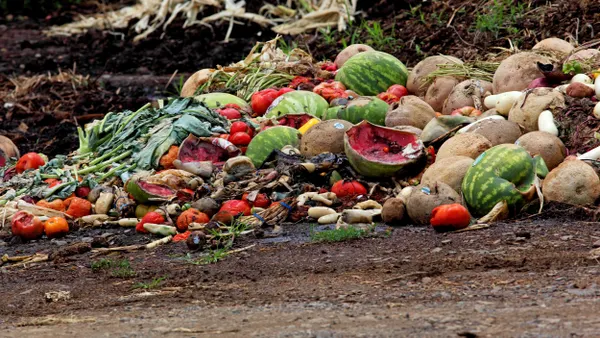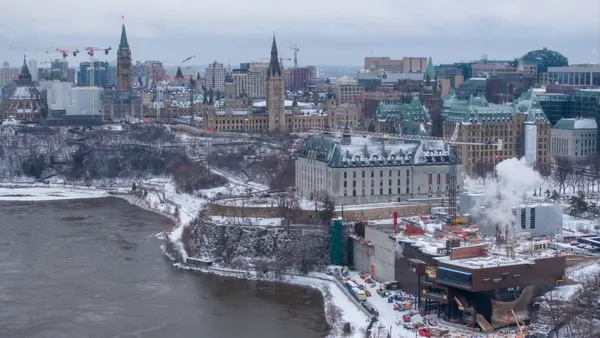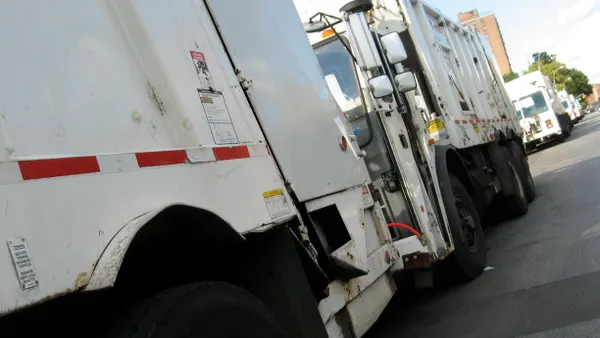Dive Brief:
- ReFed announced last week that it plans to open applications for grants later this year centered on organic waste recycling projects. The organization expects to issue 10 awards in this round, which is the fourth to open for applications since ReFed began its Catalytic Grant Fund in 2022.
- Closed Loop Partners' Center for the Circular Economy also announced on Monday that it would supply eight grants to composting projects across the country. The projects will enhance access, improve educational efforts and upgrade equipment capable of processing compostable packaging.
- Through the first nine months of the year, investment in food waste solutions totaled $462 million, according to ReFed's capital tracker. That already tops the $453 million invested during all of 2024.
Dive Insight:
Organics recycling is seeing additional attention from both philanthropic backers and investors this year as regulatory pressure increases in certain states. That pressure is tied in part to decarbonization targets, as methane released from wasted food in landfills is considered a significant yet addressable source of potent greenhouse gas emissions.
The ReFed grant round focuses on two goals. It seeks to advance food recycling access by investing in technologies that enhance sorting, decontamination and processing. It also seeks to reduce the methane impact of the dairy and beef sectors through a combination of solutions that include supply chain efficiencies and reducing enteric emissions produced by the cattle themselves.
The catalytic grant program is meant to serve as a bridge allowing such projects to achieve scale and attract investors, said Angel Veza, director of innovation initiatives at ReFED. Grants are typically between $50,000 and $250,000 for each awardee. The nonprofit plans to hand out up to 10 grants through the round opening later this year.
“Food waste is more than a supply chain problem — it’s a climate solution hiding in plain sight,” Veza said in a statement. “Solutions that capture value from wasted food, paired with innovations that reshape how we manage beef and dairy systems, can fundamentally shift the methane curve for years to come."
Closed Loop Partners, which manages both an investment arm and a grant-making program, partnered with the U.S. Composting Council and Biodegradable Products Institute for its latest grant round. The latter organization recently announced a new certification for home compostable products meant to provide greater clarity for both residents and commercial composters.
Four of the grants CLP issued enhance processing capabilities for composters accepting compostable packaging. That includes Bennett Compost in Philadelphia, which will be able to accept the materials at its Lawncrest facility for the first time thanks to the grant.
“This grant program is more than just funding. It’s about building a foundation for a circular bioeconomy that works in practice and eventually at scale,” said Rhodes Yepsen, executive director of BPI, in a statement. “Each project helps fulfill the value proposition of compostable packaging, transforming food scraps and food-contact compostables from everyday waste into a valuable soil amendment, creating good green jobs, and fostering resilient, thriving communities.”
Other projects include a pilot for drop-off sites in Washtenaw County, Michigan; Rubber City Reuse’s launch of 15 drop-off sites in Northeast Ohio; and the city of Takoma Park, Maryland, installing collection infrastructure in low-income multifamily housing. One grant will also go toward an educational outreach campaign run by the city of Modesto, California.
“Our partnership with BPI and USCC on this inaugural grant program showcases the power of industry leadership and collaboration to deliver outsized impact, accelerate infrastructure upgrades, and advance food waste and compostable packaging diversion goals," Kate Daly, managing partner and head of Closed Loop Partners’ Center for the Circular Economy, said in a statement.














